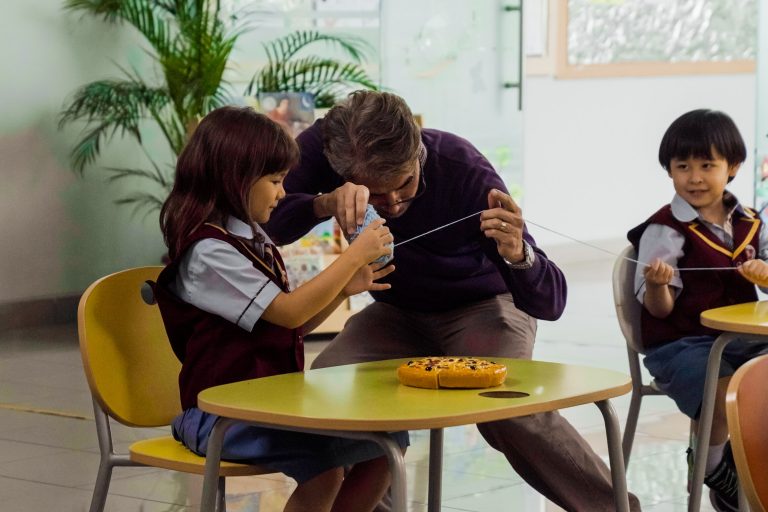Developing Student Thinking in the IB Primary Years Programme (PYP)

The International Baccalaureate (IB) offers a transformative approach to early education through the Primary Years Programme (PYP). This program nurtures student thinking skills, enabling them to become effective problem-solvers, reflective learners, and globally-minded citizens.
To achieve this, the PYP enforces carefully structured skill development, one of which is developing thinking skills. This article will discuss thinking skills and why they are important in the IB Primary Years Programme (PYP).
What Are Thinking Skills in the PYP?
In the PYP, thinking skills cover a range of cognitions that direct students to deeper, more analytical learning. These include information processing, creative thinking, inquiry, and reasoning. This provides a framework for students to approach topics thoughtfully and independently.
In the Primary Years Programme, student thinking skills are divided into four skill clusters, each with skill indicators to develop and demonstrate. Here are the skill clusters that will be explored in the PYP program.
-
Critical Thinking
Critical thinking is the heart of the PYP’s approach to education, which teaches students to analyze and evaluate issues and ideas and make decisions. This skill allows them to assess assumptions, identify biases, and make reasoned judgments. Students are encouraged to ask probing questions and reflect on different perspectives.
Students will observe issues carefully and separate ideas and knowledge into components. Then, they organize relevant information to create an argument based on evidence and associated decisions. Finally, they form decisions and develop contrary or opposing arguments before drawing conclusions.
These elaborate steps further nurture students who approach information with an open mind. This skill will help them in their pursuit of higher education and prepare them for more complex real-world problems.
-
Creative Thinking
In these skill clusters, students are encouraged to generate new ideas and consider new perspectives, which empowers them to use their creative thinking in real-world situations.
Students will learn this skill through activities that promote experimentation, allowing them to generate ideas and solutions outside the conventional thinking process.
Students are encouraged to generate new ideas and make unexpected or unusual connections between objects and ideas. Then, they consider new perspectives by asking “what if” questions and seeking information.
As creative thinking develops, students will improve their confidence, adaptability, and resilience, which are important for solving complex situations.
-
Information Transfer
In this skill cluster, students are expected to use their skills and knowledge from one context to another. This allows them to connect their learning across different subjects and apply it to real-world scenarios.
An example of this skill is using mathematical concepts they learned to address environmental issues. This encourages the connection of knowledge and reinforces that learning is not limited to individual subjects.
Students will grasp the concept that learning is a cumulative and ongoing process that helps them understand the world around them.
-
Reflection and Metacognition
Lastly, there is reflection and metacognition, where students use their thinking skills to reflect on the learning process. This helps students understand their strengths and weaknesses and then develop strategies to overcome the challenges.
In this skill cluster, students are encouraged to evaluate their progress, set goals, and improve their approach to the learning process. This allows them to develop into lifelong learners who constantly adapt and engage in self-learning.
The Importance of Student Thinking Skills in Early Years Education
Children in their early years are highly receptive to new ideas and ways of thinking. Therefore, emphasizing thinking skills during these formative years is essential to build a solid intellectual, social, and emotional development foundation. This, in turn, will prepare students for a future of continuous learning and growth.
This student thinking skills development uses a critical approach to foster students’ development. These are the two essential approaches used to train thinking skills in students:
-
Inquiry-Based Learning
Inquiry-based learning is essential to PYP as it encourages students to engage with their studies through questioning and promotes curiosity.
Students are encouraged to explore topics of interest and investigate to find answers. This creates a sense of ownership of the learning process and excitement about learning.
This approach promotes critical thinking as students gather information, analyze evidence, and draw conclusions. This engages the learning process and teaches students to become independent thinkers who actively seek knowledge.
-
Collaboration and Discussion
The following approaches are collaboration and discussion, which help develop student thinking skills in their young minds. These practices help students understand the importance of learning, sharing, and reflecting on different perspectives.
Students are assigned group work, where they can collaborate and discuss with each other. This will teach them to respect different viewpoints, communicate their ideas, and work collectively towards shared goals.
This method also allows them to refine their thinking by exposing them to alternative ideas and approaches. Thus, it enhances their critical and creative abilities by discussing and openly expressing their thoughts. This also helps build confidence in their abilities and promotes respect and empathy between their peers.
Why Do Thinking Skills Matter in the PYP?
Student thinking skills are essential in PYP, as they promote quality learners who are not only academically prepared but also socially and emotionally aware of the diversity in the real world. This will be valuable for students as they grow and encounter an increasingly interconnected and dynamic world.
The learning methods focus on critical, creative, and reflective thinking, which helps students become more adaptable and able to tackle complex challenges. This empowers students to handle issues more meaningfully and builds their sense of responsibility and ethics.
PYP’s emphasis on student thinking skills grows a generation of thoughtful and resilient individuals. These individuals will be prepared for the academic challenges of their future and for life in a global society.
Find out how BINUS SCHOOL Simprug helps prepare for the young by Nurturing Young Learners: A Look at the IB PYP Early Years for Early Childhood.
References
https://ibo.org/contentassets/8d04d269392d42c18e71529afa337a7c/pyp-mcguinness-full-report-en.pdf
https://ibo.org/globalassets/new-structure/research/pdfs/student-thinking-skills-en.pdf

